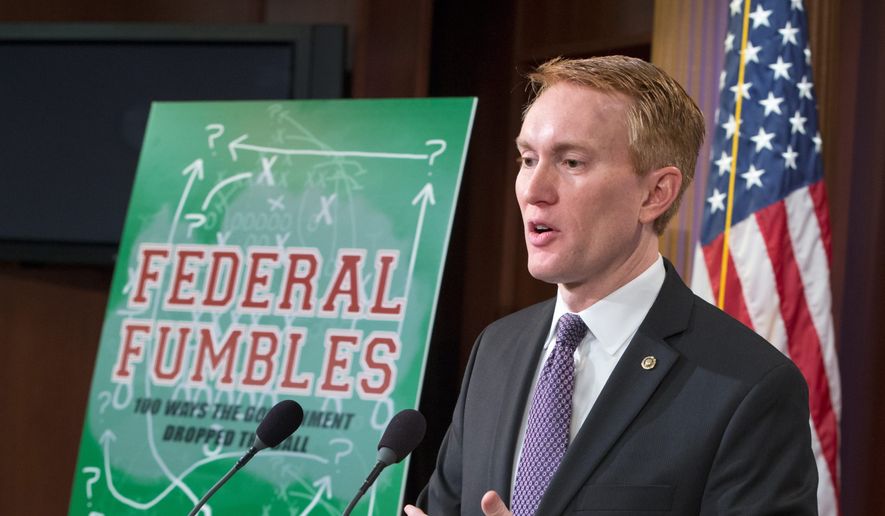From federal regulations governing the taking of pictures with llamas, to taxpayer-funded studies of small woodland birds, there’s plenty of waste still left to be trimmed out of the government, Sen. James Lankford said Monday as he released his inaugural “Federal Fumbles” report calling out the government’s bizarre and bogus decisions.
The freshman Oklahoma Republican, who replaced former Sen. Tom Coburn, who for years was Congress’s top waste-watcher, singled out 100 items spanning $105 billion in spending and $800 billion in regulatory constraints on the economy that he said the government should rethink.
Among those was what he dubbed “Llamagate” — a set of federal rules that a Phoenix couple ran afoul of earlier this year when they were told they needed a federal permit from the Agriculture Department if they wanted to raise and “showcase” llamas.
His solution to the llama problem was to get the federal government out of the business and leave regulations to states and local governments.
“The fumble book that we have isn’t just waste. It’s also areas where the federal government has violated its trust responsibilities. Wasting taxpayer dollars. Programs that are rife with fraud. Duplications and inefficiency. Overregulating that raises the cost of goods and services for the consumer,” Mr. Lankford said.
His report is one of a series planned by lawmakers hoping to carry on Mr. Coburn’s cost-cutting legacy.
SEE ALSO: Kevin McCarthy: Congress will avoid shutdown
Mr. Lankford targeted the small and the big: a $5,000 National Park Service documentary on “master fiddler” Roger Howell, and Social Security’s practice of paying both disability benefits and unemployment benefits to the same person.
Since disability payments are given to people who cannot work, and unemployment is given to people who are capable of working but do not currently have a job, he said it does not make sense to give both payments to the same person.
Messages left with the Agriculture Department, Social Security and the Park Service seeking comment on their projects weren’t returned Monday.
Mr. Lankford also called out the Earned Income Tax Credit — a program he dubbed a “fraud” that cost the government $18 billion a year — and blasted the Dodd-Frank Act, passed in the wake of the 2008 Wall Street collapse, which he said was making it impossible for people in rural America to get home loans.
When such overspending and overbearing federal regulations happens, it is not government employees who pay for it, but the taxpayer, Mr. Lankford said.
He touted his own bill, the “Taxpayers Right-to-Know Act,” that would put all federal spending into a searchable database available to the public and press who could act as watchdogs for federal spending.
SEE ALSO: New Senate waste-watchers fill up ‘Federal Fumbles’
He said the pressure from the public is critical because lawmakers in Washington have lost sight of what is important in spending. He said even under the most ambitious of plans, Congress would take 10 years to balance the budget and reach a surplus — and then it would take decades to pay off the debt that’s built up.
“If we had a $50 billion surplus in the eleventh year, if we did that, we would have to continue to do it every year for the next 460 years to pay off our debt,” he said.
• Anjali Shastry can be reached at ashastry@washingtontimes.com.




Please read our comment policy before commenting.